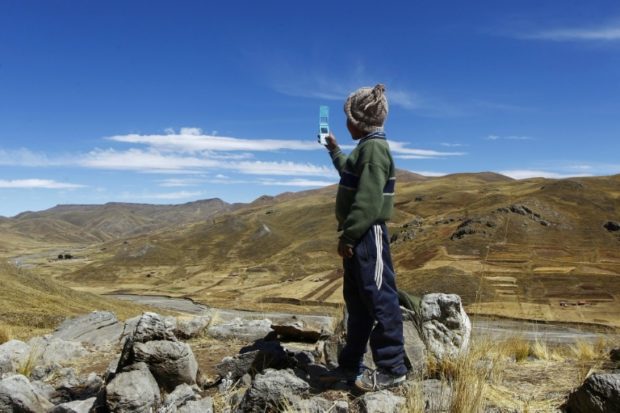Worldwide, 463 million children can’t access virtual schooling — U.N.

Alvaro Cabrera, 10, searches for a cellphone signal atop a hill near Manazo, Peru while trying to take part in a virtual class. Image: AFP/Carlos Mamani
Amid the COVID-19 pandemic and widespread school closures, at least one-third of students affected around the world lack access to virtual education, according to a United Nations (U.N.) study released Wednesday.
In all, an estimated 463 million children lack the equipment or electronic access to pursue distance learning, said the report from the U.N. Children’s Fund (UNICEF).
“The sheer number of children whose education was completely disrupted for months on end is a global education emergency,” Henrietta Fore, executive director of UNICEF, said in a statement.
“The repercussions could be felt in economies and societies for decades to come,” she said.
The U.N estimates that 1.5 billion children worldwide have been affected by lockdowns or school closings occasioned by the pandemic.
Article continues after this advertisementThe report underlined gaping geographical differences in children’s access to distance education, with far fewer affected in Europe, for example, than in Africa or parts of Asia.
Article continues after this advertisementThe U.N. report is based on data gathered from roughly 100 countries, measuring public access to the internet, to television and to radio.
Even children with adequate access may face other obstacles to distance education — whether the lack of a good workspace at home, pressure to do other work for the family, or a lack of technical support when computer problems arise, the UNICEF report said.
Among students around the world unable to access virtual education, 67 million are in eastern and southern Africa, 54 million in western and central Africa, 80 million in the Pacific and East Asia, 37 million in the Middle East and North Africa, 147 million in South Asia, and 13 million in Latin America and the Caribbean.
No figures were given for the United States or Canada.
With the new school year soon getting underway in many countries – including in-person classes in many places – UNICEF urged governments to “prioritize the safe reopening of schools when they begin easing lockdown restrictions.”
Where reopening is impossible, governments should arrange for “compensatory learning for lost instructional time,” the report said. IB
RELATED STORIES:
Student threatens peers with gun in online classes, arrested
For more news about the novel coronavirus click here.
What you need to know about Coronavirus.
For more information on COVID-19, call the DOH Hotline: (02) 86517800 local 1149/1150.
The Inquirer Foundation supports our healthcare frontliners and is still accepting cash donations to be deposited at Banco de Oro (BDO) current account #007960018860 or donate through PayMaya using this link.